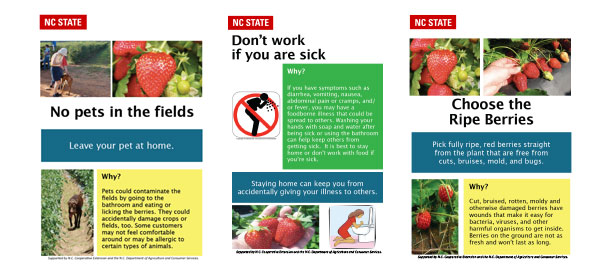

Jul 16, 2015Food safety posters developed for pick-your-own farms
Keeping food safety on the minds of direct-market farm customers – as well as workers – can often be a simple matter of communication.
North Carolina State University’s (NCSU) Plants for Human Health Institute recently published a series of printable posters to help educate customers and workers about fresh produce safety and optimal postharvest handling at u-pick strawberry farms.
“During strawberry season, we hope that growers will post these resources on their farms to help ensure that the berry-picking experience is not only fun, but as safe as possible from field to table,” said Diane Ducharme, NCSU Extension associate in horticulture and food safety.
The free, downloadable posters are available here. Go to Food Safety Messages sections.
North Carolina producers harvest approximately 20.3 million pounds of strawberries annually, with pick-your-own accounting for 25 percent of the strawberries sold.
“The posters are an important educational tool for growers, because while food safety measures are part of standard training procedures for farm workers, consumers visiting pick-your-own operations may not be familiar with best practices for handling fresh produce,” Ducharme said.
Three sets of posters are available. Two sets, targeting consumers and workers, serve as one-page visual reminders, each including a single point such as, “Don’t pick when you’re sick,” and a brief explanation.
The third set of posters is designed in a storytelling manner, where the food safety and postharvest handling messages are delivered by following a storyline about a family outing to a u-pick strawberry farm. Each page asks readers to identify what’s wrong in the story and teaches the corrective action.
In addition, a card with tips for maintaining berry quality after picking was developed as a customer take-away. Growers can customize the card with their farm name prior to printing.
Amy Douglas, owner of The Farmers’ Daughter in Taylorsville, North Carolina, told Extension educators she planned to use some of the posters near hand-washing stations and restrooms at the farm’s pick-your-own field.
“I would also print them all and put them in a three-ring binder to help educate employees and customers,” Douglas said.
The resources were created to provide growers with visual reminders on food safety to use with their direct-market customers.
“In our focus groups, growers also requested that food safety and postharvest information be combined so that one consistent message could be conveyed,” Ducharme said.
The posters (8.5 x 11.5) were created by Ducharme, Katrina Levine, Ben Chapman and Penelope Perkins-Veazie.
Other food safety messages for consumers include: Wash Your Hands; Use Clean and Sanitized Picking Containers; No Pets in the Fields; No Eating, Drinking or Smoking in the Fields; Choose the Ripe Berries; and Chill Quickly.
There’s also the Take Home Card for Consumers: For Best Berries. The card is customizable, with an area at the bottom to add a farm name.
“We found that if we were giving messages to consumers on safe practices while in the field, we needed to have some reminders for both the growers and workers in those same fields,” Ducharme said.
The tips for workers include: Wash Your Hands; Don’t Work When You Are Sick; Clean and Sanitize Containers; Serve Safe Samples; and Keep Samples Covered.
North Carolina ranks third in the United States in strawberry production, based on crop value. Strawberries are grown on more than 1,600 acres and generate more than $29 million in income during the five- to eight-week season. Nearly all North Carolina strawberries are sold for fresh market, direct to consumer or through local grocery chains.














